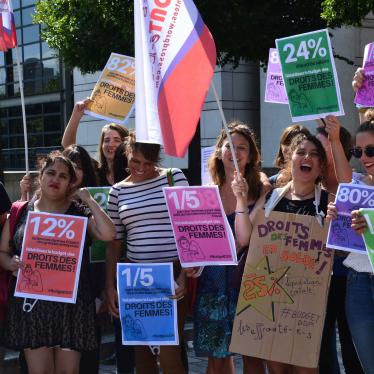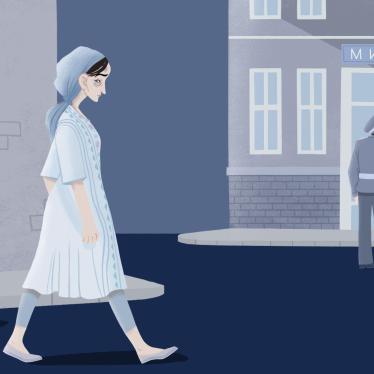International Women’s Day on March 8 is a stark reminder of how gender discrimination and gender-based violence – in homes, in relationships, on the streets, and at work – is a devastating reality for women and girls across France.
In the past year alone, survivors and activists have called for improved protection from sexual harassment and violence at work and demanded immediate measures to address alarming increases in domestic violence during pandemic-related lockdowns. They have sought long-term government action to combat femicide, and brought greater visibility to incest via the viral hashtag #MeTooInceste, with a related push to raise the age of sexual consent and fight sexual violence against children.
Along with Mexico, France will co-host the Generation Equality Forum this coming summer to bring together governments, civil society, and corporations to create and commit to a 10-year blueprint to accelerate progress on gender equality.
France says it aims to be a champion for gender equality internationally, but it also should be a champion at home. President Macron and parliament should enact forward-looking and bold reforms to fight gender-based violence, and show up on the global stage not only as a convener but also as a model.
This includes becoming an “early ratifier” of the landmark ILO Violence and Harassment Convention which sets out global standards for preventing and responding to violence and harassment at work and making accompanying national reforms.
In an April 2019 survey conducted by Ifop for Fondation Jean Jaurès and Foundation for European Progressive Studies, 30 percent of women in France surveyed reported sexual harassment at work. Sexual harassment and violence affects all types of workers, from government employees to those who provide care in private homes. France has significant gaps in prevention measures, workplace support, and the ability to obtain legal remedies.
In just one example, according to court documents, a home worker left her job in Reims in 2018, exercising her right of withdrawal, complaining that after her employer exposed himself to her, requested oral sex, walked around naked, and ordered lingerie in the hopes she would wear it while she cleaned. But last September, a Reims appeal court ruled that there was insufficient evidence to establish sexual harassment, in part because there was no medical certificate or direct testimony.
On February 17, almost 10 years after allegations were first made public, a Paris appeals court sentenced Georges Tron, a former cabinet minister, to five years in prison for raping an employee of the municipality of Draveil, south of Paris, where he was and continues to be the mayor. When Tron was originally acquitted, in 2018, he was represented by Justice Minister Éric Dupond-Moretti, who declared the decision “a victory for justice not the defense” and warned the jury that their sons could be accused of sexual assault for touching their girlfriends’ knees.
The ILO Violence and Harassment Convention outlines measures governments should take to strengthen prevention, improve complaints channels, ensure accountability, and regulate employers.
Labor Minister Muriel Pénicaud was one of the first to pledge to pursue ratification when the treaty was adopted in June 2019. But while some countries have completed their ratification processes, France is falling behind. After repeated calls for action from unions and other groups, the current labor minister, Elisabeth Borne confirmed on November 25 that the government was committed to ratification.
To change the daily reality for workers, though, ratification must be accompanied by national reforms.
First, the government should introduce penalties for employers who do not have a violence protection plan and do not address sexual harassment in their assessment of occupational risks. French law requires these plans, but a reported 80 percent of employers don’t have them.
Second, the French government should prohibit companies from dismissing workers for reasons related to domestic violence and guarantee survivors’ flexibility to reorganize their working hours to protect against the abuse. The Covid-19 pandemic highlights the importance of such protections so that domestic violence victims can ensure their safety without fear of losing their jobs. France should join New Zealand, which provides domestic violence survivors 10 days of paid leave to seek safety and help.
Third, the government should train and broaden the mandate of employee counselors to support workers dealing with sexual harassment and other gender-based violence including domestic violence. It should also mandate training for managers and human resources personnel, and “know your rights” awareness-raising programs for all workers. Stigma and fear of retaliation and other obstacles impede reporting sexual harassment and violence at work.
Finally, France should require French companies to identify, prevent and respond to the risks of violence and sexual harassment in their supply chains – often the most vulnerable workers – under its 2017 due diligence law.
President Macron and the French government have made positive – albeit overdue – commitments to prioritize and fight gender-based violence. Before this summer’s international forum. France should not only ratify the ILO convention but introduce strong and progressive national reforms to combat workplace violence and harassment. This is key for protecting women workers in France and setting a high standard for commitment and action by other governments ahead of the Generation Equality Forum this summer. The stakes – women’s freedom and safety – are high, and there is no time to waste.
Join Human Rights Watch's campaign urging France to fight sexual harassment and violence at work here.
..
Nisha Varia is the women’s rights advocacy director at Human Rights Watch.
Luc de Ronne is the President of ActionAid France.
Philippe Lévêque is the Executive Director of CARE France.









